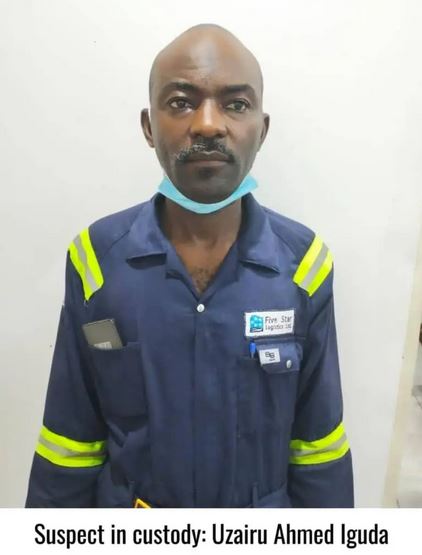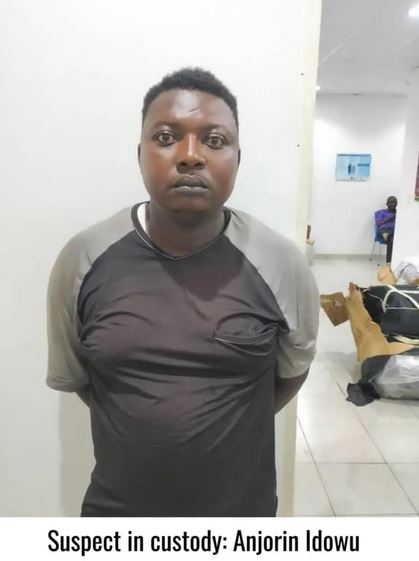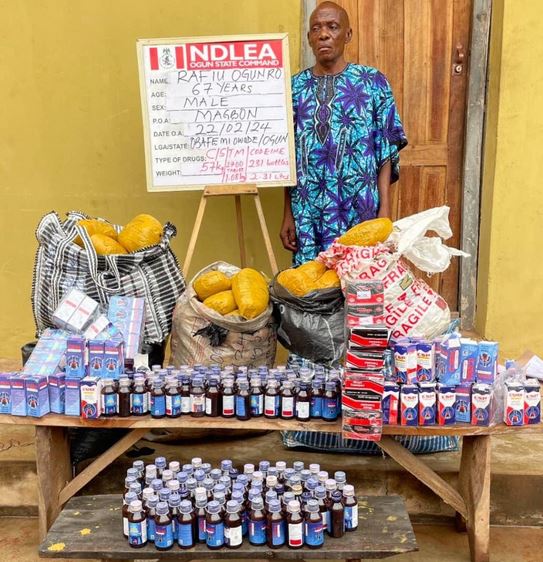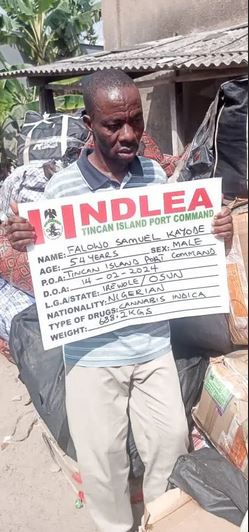Admin
Fayose: Buhari not a blessing to Nigeria — he drew the country back by 50 years
Ayodele Fayose, ex-governor of Ekiti, says former President Muhammadu Buhari is “not a blessing” to Nigeria.
Speaking in an interview on Channels Television on Sunday, Fayose said the administration of Buhari “drew us back to 50 years of our history”.
Over the past few months, Nigerians have been battling economic hardship as the prices of food and other basic items have skyrocketed.
Protests over the economic hardship have taken place in some parts of the country.
Reacting to the development, Fayose said Tinubu inherited a “dead economy” adding that there is little the president can do to revive the situation within nine months.
The former Ekiti governor accused the Buhari-led administration of destroying the country’s economy.
He asked Tinubu to stop praising Buhari in order not to confuse Nigerians about the “mess” created by the former president.
“Look at the eight years of President Muhammadu Buhari, what will be left of a country like Nigeria as of today?” he asked.
“Even if Tinubu means well, where do you place the debt? Even if Tinubu wants to do the magic, how will he fix the country? There were loans taken in Buhari’s administration, some with 20 to 50 years moratorium.
“Unborn children will face the kind of situation the last administration has plunged this country into.
“The only thing I want to say to President Tinubu is that, without fear or favour, he should stop praising former President Buhari.
“I watched a live television programme of the president telling Nigerians that former President Buhari did well.
“That will cause confusion in the minds of Nigerians. Yes, he is a member of our party and a leader.
“There are so many presentations we can make without celebrating a man who has put Nigerians in this predicament.
“There are things you should not say. You can visit, love, and appreciate him, which is personal to the president.
“Buhari is not a blessing to Nigerians, with all due respect. President Buhari is not a blessing to Nigeria, he drew us back to 50 years of our history.”
[TheCable]
Final Communique – Extraordinary Summit of The ECOWAS Authority of Heads Of State and Government on The Political, Peace and Security Situation in The Region
1. The Authority of Heads of State and Government of the Economic Community of West African States (ECOWAS) met in an Extraordinary Session in Abuja, Nigeria on 24th February 2024, under the chairmanship of H.E. Bola Ahmed TINUBU, President of the Federal Republic of Nigeria and Chairperson of the ECOWAS Authority.
2. The Extraordinary Summit was convened to consider the political, peace and security situation in West Africa.
3. Present at the Summit were the following Heads of State and Government or their mandated representatives:
• H.E. Patrice TALON, President of the Republic of Benin.
• H.E. Alassane OUATTARA, President of the Republic of Côte d’Ivoire.
• H.E. Nana Addo Dankwa AKUFO-ADDO, President of the Republic of Ghana.
• H.E. Umaro Sissoco EMBALO, President of the Republic of Guinea Bissau.
• H.E. Bola Ahmed TINUBU, President of the Federal Republic of Nigeria.
• H.E. Macky SALL, President of the Republic of Senegal.
• H.E. Julius Maada BIO, President of the Republic of Sierra Leone.
• H.E. Faure Essozimna GNASSINGBE, President of the Togolese Republic.
• H.E. Muhammed B. JALLOW, Vice President of the Republic of The Gambia.
• H.E. Amb. Belarmino M. SILVA, Ambassador to the Federal Republic of Nigeria and ECOWAS of the Republic of Cabo Verde.
• H.E. Amb. Alhassan CONTEH, Ambassador to the Federal Republic of Nigeria and ECOWAS of the Republic of Liberia.
4. The Summit was also attended by:
● H.E. Dr Omar Alieu TOURAY, President of the ECOWAS Commission.
● H.E. Amb. Bankole Adeoye, Commissioner for Political Affairs, Peace and Security of the African Union Commission on behalf of the Chairperson H.E. Moussa Faki Mahamat.
● H.E. Leonardo Santos SIMÃO, Special Representative of the United Nations Secretary General for West Africa and the Sahel and Head of UNOWAS.
● H.E. Dr. George Agyekum Nana Donkor, President, ECOWAS Bank for Investment and Development (EBID).
● H.E. Jean-Claude Kassi-Brou, Governor, Central Bank of West African States (BCEAO)
● Ambassador Baba Kamara, ECOWAS Special Envoy on Counter-Terrorism.
The Authority, having
5. Received the memoranda of the President of the ECOWAS Commission on the political, peace and security situation in the West African region.
6. Extensively discussed the latest developments in the region.
7. Discussed the situation in the Republic of Niger since 26 July 2023 when the Military of the Republic of Niger overthrew the Government of President Mohamed Bazoum and kept him under house arrest.
8. Discussed the notifications given by Burkina Faso, Mali and Niger about their decision to withdraw from ECOWAS.
On the Republic of Niger, the Authority
Recalled its decisions taken during the 1st and 2nd Extraordinary Sessions on Niger on 30 July and 10 August 2023 and those taken at its 64th Ordinary Session on 10 December 2023.
9. Notes with regret that despite multiple efforts by ECOWAS, former President Mohamed Bazoum remains in detention and no plan for transition has been developed by the Conseil national pour la sauvegarde de la patrie (CNSP) government of Niger.
10. Recalls the ECOWAS principle of Zero tolerance for unconstitutional changes of government as enshrined in the ECOWAS and African Union Protocol and Charter, respectively, and other instruments.
11. Reiterates its commitment to maintaining dialogue with the Government of Niger with a view to securing the release of President Bazoum and agreeing on a transition timetable.
12. Takes note of the lent period and the approach of the holy month of Ramadan.
13. Also takes note of the appeal made to the leaders of the region by His Excellency General Yakubu Gowon, former Head of State of the Federal Republic of Nigeria and founding father of ECOWAS, the pleas made by the Malehossou Foundation in Benin and several other personalities and humanitarian organizations regarding the situation in Niger.
On the Withdrawal of the Three Countries
14. The Authority notes that the withdrawal will have political, socio-economic, financial and institutional implications for the three countries as well as for ECOWAS as a group. Political and Security Implications
15. The Authority recalled that within the framework of regional cooperation against terrorism, violent extremism, and organized crime, the three countries benefited from USD 100 million mobilized by UEMOA within the context of ECOWAS Plan of Action against terrorism. Moreover, some Fund allocations (USD7.5 m) have been made towards supporting the three countries in acquiring equipment to help their fight against terrorism.
16. The withdrawal will affect security cooperation in terms of sharing intelligence and participation in regional counter-terrorism initiatives, such as the Accra Initiative and Multinational Joint Task Force.
17. The withdrawal may also lead to diplomatic and political isolation at the international scene where the countries have obtained bloc support for their candidates and candidature in the contest for international positions within the African Union, the United Nations, and similar bodies.
Socio-Economic Implications
18. The withdrawal will automatically affect the immigration status of the citizens as they may be required to obtain visa to travel around the region. Citizens may no longer be able to reside or set up businesses under ECOWAS arrangements and may be subject to diverse national laws. The three countries 6 will cease to use ECOWAS passports, ECOWAS Biometric National Identity Card and the region-wide "ECOWAS Brown Card" vehicle insurance.
19. The three member states represent 17.4% of the region’s 425 million population. Even though they represent 10% of the region’s GDP, their departure will constitute a reduction of the market size of ECOWAS.
20. Intra-community trade may also be disrupted, especially trade in unprocessed goods such livestock, fish, plant, agriculture produce, mineral products and Traditional Handicraft Products as well as Industrial Products of Community Origin.
21. The Authority further notes that the three countries are beneficiaries of several regional projects and programmes, notably:
a. The Regional Food Security Reserve (the three countries host stocks from the Regional Reserve for a quantity of nearly 17,000 tons or 52% of the regional stock).
b. The Regional Support Program for Pastoralism in the Sahel (PRAPS – Financed by the World Bank) in the amount of USD 215 million for the three States.
c. The Sahel Regional Irrigation Support Program (PARIS – Financed by the World Bank) in the amount of USD 103.43 million for the three States.
d. The Regional Food System Resilience Support Program (FSRP funded by the World Bank) in the amount of USD 230 million for the three states.
e. West Africa Single Identity and Regional Integration and Inclusion (WURI) project.
f. The ECOWAS Regional Electricity Market (West Africa Power Pool) project that links all member states to a regional electricity grid for improved access to electricity involves the three member states.
22. The withdrawal of the three Member States could result in the halt or suspension of all ECOWAS Projects/Programmes worth more than US$500 million.
Financial Implications
23. The Authority notes that the two regional financial institutions, EBID and BOAD have considerable exposure in the three countries. EBID currently has 27 ongoing public sector projects in the three countries (Burkina Faso 9, Mali 8, and Niger 10) and a total of 20 private sector projects (Burkina Faso- 5; Mali -13 and Niger- 2). These projects are collectively valued at approximately USD 321,634,253 of which public sector projects constitute 38.1 per cent and private sector projects constitute 61.9 per cent.
24. The bank’s portfolio in the three countries represents approximately 22.5 per cent of the Bank’s total portfolio in the 15 member states. The three countries contributed a total of USD 33,135,445.38 to the capital of the Bank, made up as follows: Burkina Faso - USD 13m; Mali - USD 9.5m; and Niger - USD 10.5m.
Institutional Implications
25. Reviewing the implications at the institutional level, the Authority notes that the withdrawal will not only require the closure of 4 regional entities in Burkina Faso, two regional bodies in Mali and one regional office in Niger, it will also affect the job security of some 130 ECOWAS staff who are citizens of the three countries: 77 from Burkina Faso; 23 from Mali and 32 from Niger.
THE AUTHORITY RESOLVES AS FOLLOWS:
Release of President Bazoum
26. The Authority calls for the immediate release of His Excellency Mohamed Bazoum, former President of the Republic of Niger as well as his family and political detainees;
On Sanctions
27. The Authority decides to lift with immediate effect the following sanctions imposed on the Republic of Niger:
a. Closure of land and air borders between ECOWAS countries and Niger;
b. Institution of ECOWAS no-fly zone on all commercial flights to and from Niger;
c. Suspension of all commercial and financial transactions between ECOWAS Member States and Niger;
d. Freeze of all service transaction including utility services and electricity to Niger Republic ;
e. Freeze of assets of the Republic of Niger in ECOWAS Central Banks;
f. Freeze of assets of the Niger State, State Enterprises and Parastatals in Commercial Banks;
g. Suspension of Niger from all financial assistance and transactions with all financial institutions, particularly, EBID and BOAD;
h. Travel ban on government officials and their family members.
28. The Authority decides to lift restrictions on the recruitment of citizens of the Republic of Mali to professional positions within ECOWAS institutions.
29. The Authority decides to lift financial and economic Sanctions on the Republic of Guinea. 9
30. The Authority instructs the President of the Commission to invite all four ECOWAS Member States in transition to technical and consultative meetings of ECOWAS as well as to all security-related meetings.
31. The Authority decides to maintain all other measures provided for by the relevant decisions and instruments of ECOWAS and the African Union and to review them from time to time in accordance with progress realized.
32. The Authority calls on ECOWAS Institutions, Member States, WAEMU and all other regional institutions to implement these decisions.
On the Withdrawal of the Three Countries, the Authority:
33. Takes note of the notifications by the three Member States of Burkina Faso, Mali and Niger to withdraw from ECOWAS.
34. Draws the attention of the three Member States to Article 91 of the 1993 ECOWAS Revised Treaty regarding the procedures of withdrawal while urging the countries to reconsider the decision, in view of the benefits that all ECOWAS Member States and their citizens enjoy for being part of the Community.
35. Expresses its Concern over the socio-economic, political, security and humanitarian impacts of the decision, particularly on the citizens of the three Member States and on the regional integration process, and further urges the three Member States to resort to dialogue, negotiation, and mediation to address their concerns.
36. Urges the three Member States to adhere to the provisions of the 1993 Revised Treaty, relating to withdrawal, particularly Article 91.
37. Directs the ECOWAS Commission to sustain the Community’s rapprochement and overtures towards the three Member States and continue to remain seized of the situation.
38. Instructs the ECOWAS Commission to engage the African Union, UEMOA, UN and other international organizations as well as bilateral partners on the issue with a view to convincing the three Member States to remain in the Community.
39. Directs the ECOWAS Commission to broaden the Community outreach towards the three Member States to include traditional and religious leaders, eminent personalities, civil society and women leaders for the unity and security of the region.
40. Reiterates the urgent need for the ECOWAS Commission to expedite the operationalization of the Standby Force in its kinetic mode to fight against terrorism in the region, including the elements of the Multinational Joint Task Force (MNJTF) and the Accra Initiative, as directed by the Authority. In this regard, instructs the Commission as soon as possible to convene the meeting of Ministers of Finance and Defence to propose modalities for financing and equipping the counter-terrorism force.
41. Further instructs the Commission to develop an effective communication strategy in engaging Member States and the Community citizens in view of the ongoing mis/disinformation targeted at undermining ECOWAS.
On the Republic of Senegal
42. The Authority takes note of the end of President Macky Sall’s term of office on 2 April 2024 and commends him for the tremendous achievements in infrastructure and economic development he has realized as President of the Republic of Senegal and for his invaluable leadership in Africa and the world. 11
43. The Authority Calls on all Senegalese stakeholders to give priority to dialogue with a view to preserving the democratic gains of Senegal through a free, inclusive and transparent Presidential election.
On African Development, Sovereignty and Unity
44. The Heads of State and Government underscore their Commitment to Africa’s Sovereignty, independence and unity.
45. In this regard the Authority calls on all Partners to respect the sovereignty and independence of African States and refrain from interferences and meddling that destabilize Member States and adversely impact regional unity.
46. The Authority further calls for an effective global partnership for the region’s socio-economic development through, inter alia, fair trade and climate justice.
Appreciation
47. The Authority expresses its gratitude to His Excellency General Yakubu Gowon for his interest in the welfare of the Community and for his valuable suggestions.
48. The Authority further expresses gratitude to H.E. Bola Ahmed TINUBU, President of the Federal Republic of Nigeria and Chairperson of the ECOWAS Authority, for convening the Extraordinary Session and for the able manner he has been conducting the affairs of the Community.
Done at Abuja, this 24th day of February 2024
THE AUTHORITY
[OPINION] An Open Letter to Senator Godswill Akpabio, President of The Senate of The Federal Republic of Nigeria - Nduese Essien
My Dear Senate President,
Modesty Is a Virtue to Embrace
I hope this letter finds you well, despite the passage of time since we last communicated directly. It is with a heavy heart that I take this public platform to address you, given our longstanding relationship and the mutual respect we have shared. Over the past three years, attempts to reach out to you have been met with silence, prompting me to resort to this open correspondence. It is crucial that I express my concerns openly, not only for your sake but also for the sake of our friends and constituents who may witness this exchange.
As I recently celebrated my 80th birthday, I took the opportunity to reflect on my life's journey and the contributions I have made to our community, state, and nation. In humble acknowledgment of the blessings bestowed upon me by God, I am deeply grateful for the role you have played in shaping my political trajectory. Our association has been mutually beneficial, from my appointment as a minister in 2009 to my participation in the 2014 National Conference, which you recommended me for. Likewise, I recall with fondness the support extended to you before and during the 2007 general elections, which culminated in your successful emergence as the governor of our beloved state. It is evident that our paths have been intertwined in meaningful ways, and it is out of a sense of duty and genuine concern that I implore us to reconnect and offer each other the care and counsel we owe ourselves.
Your Excellency, as you strive to provide the required leadership as Senate President and Chairman of our esteemed National Assembly, I feel compelled to draw your attention to the critical role that previous National Assemblies, particularly those between 1999 and 2007, played in steering our country towards economic growth and democratic stability. Throughout that time, the National Assembly demonstrated its dedication to accountability and the rule of law. Notably, it was a period when critical anti-corruption authorities were established and regulatory agencies were strengthened, setting the framework for growth and a robust national economy. That era saw phenomenal per capita growth, demonstrating the value of legislative oversight and the preservation of democratic values.
The lessons from this period are clear: a robust National Assembly is essential for fostering economic growth, ensuring respect for the rule of law, and securing justice for all citizens. It is imperative that the legislature serves as a check on the executive, rather than merely acquiescing to its dictates. Regrettably, the Senate and House of Representatives between 2019 and 2023 fell short in fulfilling their constitutional duties. By failing to effectively check the executive and allowing many illegalities to go unchecked, they contributed to the hardships facing our nation today. As you lead the National Assembly, I urge you to heed the lessons of history and prioritize the interests of the people above all else. Uphold the principles of transparency, accountability, and justice, and ensure that the legislature functions as a true bastion of democracy. To accomplish the foregoing, you must speak less, listen to your colleagues more, and monitor the national mood before wielding the gavel. By doing so, you will lead the National Assembly in collaborating with the Executive and the Judiciary to create a better future for our dear country.
In a televised plenary session last Tuesday, you told Nigerians that you had received an unverified report about the purported allocation of N30 billion to each governor of the Federation by the Federal Inland Revenue Service (FIRS) to mitigate inflation and food prices in their states. Before making such a public statement, you as the leader of the Nigerian legislature and one of the highest-ranking officials in the current administration should have thoroughly verified such a claim. The subsequent rebuttal of this claim by Oyo State Governor Seyi Makinde and the loud silence from All Progressives Congress (APC) governors suggest you did not double-check the information before giving it the public. This serious error, along with previous blunders, harms your leadership reputation. I urge you to stop making hasty and unfounded claims that could inflame tensions or damage the government and the institution you represent. It is important to apply caution when we speak as leaders.
Sir, I am compelled by a sense of duty to address the inconsistencies that have come to characterise your political expressions, particularly within our beloved Akwa Ibom State. Your Excellency, during the 36th Anniversary Thanksgiving service of our state creation at the Apostolic Church in Uyo in 2023, you declared, “all local government areas in the state as oil producing, and that there should be no distinction among them in terms of sharing of resources or benefits.” I was shocked because throughout your eight years as Governor of the state, you never said so though you were blatant in depriving the oil producing areas of their rights. You refused to establish the Oil Minerals Producing Areas Commission in the state, despite demands and pressures, thus making Akwa Ibom the only oil producing state without this commission. You also diverted most of the NDDC projects to non-oil producing areas of the state. It is now clear how and why you operated that way.
While you have been an apostle of “every local government in Akwa Ibom being oil-producing,” can you now reconcile your claim on the floor of the Senate that the whole of Nigeria is not oil-producing? In the same service, you directed the state Governor not to implement the law establishing the authentic political map of the state. The law was promulgated by the State House of Assembly in 2023. As a lawyer, former commissioner for local government and former Governor, you cannot deny knowledge of Stubbs Creek Forest and its ownership. Yet as President of Senate which is the country’s foremost lawmaking body, you were asking the governor to disobey a law legitimately made by the state legislature. Would you ask President Bola Tinubu not to implement a law legitimately passed by the National Assembly? Your Excellency, you will agree with me that this is not just the highest level of inconsistency, but also a baseless call for executive rascality and rebellion against the rule of law, and you should be conscious of the consequences.
Again, at another Thanksgiving Service in Eket on February 11, 2024, you advised Governor Umo Eno to reactivate and complete the Qua River Hotel in Eket within the first term of his administration. You claimed you had bought back the property and designed a 16-storey block for the hotel during your tenure as Governor and that this could be completed within two years for the use of ExxonMobil and Ekid people.
Mr. President, you were a commissioner in the administration when this flourishing hotel was thrown away for a paltry N50 million. Immediately after that administration you were Governor for eight years and never talked about the Qua River Hotel. Rather, you embarked on the high-rise Tropicana Recreation Centre in the heart of Uyo, against all entreaties, and without completing it. In the twilight of your administration, you embarked on the Four Point Hotel close to your domain and commissioned it without completion. At that time, Qua River Hotel did not still cross your mind. Why now?
Your Excellency, there is a disturbing video currently circulating in the state where you told Oron leaders that Mobil Producing Nigeria now ExxonMobil was supposed to locate its office in Oron but was taken to Eket because of politics. To the best of my knowledge, you were about five years old when the decision was taken. Agreed, there were alternative locations for the company to choose from. But investment decisions for a renowned multinational corporation like Mobil, are not taken on the spur of the moment or weighted in favour of political considerations as is done in Government House. As Governor for eight years, it was surprising that you made no effort to change the wrong political judgement and never compensated the Oron people for the perceived unfair treatment. Again, in 2014 when you had unfettered political authority to pick and install an Oron man as governor, you never did so. Why are you inciting divisive sentiments among our people in a peaceful state to destabilize it now?
In your quest to take over Akwa Ibom in 2027, these unamusing pranks will not be compelling enough to attract support. Oron is populated by intelligent and politically savvy people. The 2027 Akwa Ibom governorship election will be more complex than the "Warsaw War" of 2019, which you lost. I, therefore, advise you to apply a little caution; concentrate more on national politics to assist in rescuing the nation from its self -imposed predicaments.
God bless you, Mr. Senate President. God bless Akwa Ibom State and the Federal Republic of Nigeria.
Sincerely,
Chief Nduese Essien
Attah of Eket and former Minister of Lands, Housing and Urban Development
PHOTO NEWS: Gov. Sanwo-Olu Inaugurates Special Dispensation Palliative Advisory Committee

l-r: Permanent Secretary, Ministry of Local Government, Mrs. Kikelomo Bolarinwa as the committee secretary; Chairman, Bariga LCDA & President, Association of Local Governments of Nigeria (ALGON), Hon. Kolade Alabi; LP House of Reps member, Hon. Seyi Sowunmi; Chief Missioner, NASFAT, Imam Abdulazeez Onike; Deputy Governor of Lagos State, Dr. Obafemi Hazmat as alternate chairman; Governor Babajide Sanwo-Olu as the chairman; Mrs Joe Okei-Odumakin; LP member & former DFID official, Dr. Shina Fagbenro-Byron; Consumer Rights Advocate, Mrs. Sola Salako-Ajulo; Senior Pastor, Elevation Church, Pastor Godman Akinlabi; Youth Representative, Comrade Biliaminu Oba and Rep of the Lagos House of Assembly, Hon. Ademola Shabi during inauguration of the Lagos State Special Dispensation Palliative Advisory Committee at the Lagos House, Marina, on Saturday, 24 February 2024.
Governor of Lagos State, Mr. Babajide Sanwo-Olu (third right); Deputy Governor of Lagos State, Dr. Obafemi Hazmat (fourth right); Mrs Joe Okei-Odumakin (second right); Consumer Rights Advocate, Mrs. Sola Salako-Ajulo (right); Commissioner for Agriculture, Ms. Abisola Olusanya (left); Chief Missioner, NASFAT, Imam Abdulazeez Onike (second left) and LP House of Reps member, Hon. Seyi Sowunmi (third left) during inauguration of the Lagos State Special Dispensation Palliative Advisory Committee at the Lagos House, Marina, on Saturday, 24 February 2024.
[OPINION] High Cost Of Living: Nigeria Paying For Years Of Agricultural Neglect And Insecurity - Adémólá Òrúnbon
Nigeria is endowed with lots of natural and human resources with large expanse of fertile land and estimated to be the most populous country in the Sub-Saharan Africa. And it has different sectors such as agriculture, solid minerals, sports and entertainment, tourism etc, yet the citizens live in abject poverty subsisting on less than $2 a day as a result of several factors which includes inappropriate domestic policies and an unfavourable external economic policy and environment. The country discovered oil in 1956, over sixty-eight (68) years ago at Oloibiri in today's Bayelsa state, but over 70 percent of the country's earnings come from oil paying, little or no attention to other sectors of the economy and that is why Nigeria is said to be suffering from what is known as the "Dutch Disease".
In Nigeria, agriculture remains the mainstay of the economy, employing about 65-70 percent of the labor force. Agricultural holdings are generally small and scattered; farming is often of the subsistence variety which characterised by simple tools and shifting cultivation. These small farms produce about 80 percent of the total food. About 30.7 million hectares (76 million acres), or 33 percent of Nigeria's land area, are under cultivation. Nigeria's diverse climate, from the tropical areas of the coast to the arid zone of the North, make it possible to produce virtually all agricultural products that can be grown in the tropical and semitropical areas of the world.
Squealing to the discovery of petroleum, Nigeria has rapidly grown into a major food importing nation as the government has become neglectful of the agricultural sector since petroleum is considered a more viable resource for economic development. This situation quickly polarized the nation into high and low income groups. Unfortunately, while only small fraction of the population benefited from the oil wealth, the population suffered the misfortune of food insecurity as they can hardly afford the rising prices of imported foods. However, though at a subsistence level, a sizable ratio of the population in Nigerian is still employed in the agricultural sector.
Food security is a phenomenon which is multidimensional with economic, environmental and social aspects. Unfortunately, the greater share of the population of the undernourished is located in the developing countries. Although the total population of the food insuring people in Asia outweighs that of Africa, 18 out of 23 nations where undernourishment is prevalent are from Africa.
Food is no doubt, the most basic of all human survival needs. Although, so many efforts have been sunk in improving the quality as well as production of world food supplies, food insecurity remains prevalent, particularly in the global southern nations of Asia and Africa, and in Nigeria, malnutrition has resulted in death of many of its citizens. African Food Security Briefs (AFSB) estimated that approximately one out of every three persons in the sub-Saharan Africa is undernourished. Achieving a sustainable economic development in Nigeria and Africa at large will continue to be a mirage without well-nourished and healthy people.
In fact, failure to ensure food security has unavoidably resulted in many social problems including civil unrest and riots in many major cities of the world. Some economic experts, described food system and its governance as a process with complex web which many times overlapped or even contradicted with formal policies and regulations, and made even worse by the unwritten laws and practices which may not be susceptible to political subjugations. Food insecurity is therefore strongly linked with other global issues, such as population growth, surge in energy demand as well as completion for land and water and issues of climate change.
Though, Nigeria prides itself as the giant of Africa with its economy becoming the largest in 2014, the poverty rate in the country is alarming. Not less than 70% of the Nigerian population is surviving on less than $2 per day while food insecurity prevalence in the low income urban house-holds and rural areas respectively stands at 79% and 71%. Since the discovery of oil in Nigeria in the 1956, the agriculture sector became less important to the government as it cannot withstand the economic sagacity of the oil industry. Thus, Nigeria became heavily dependent on importation of food. The rural areas have become even more vulnerable to malnutrition, erratic supply of food items, unaffordable food costs, low quality foods and sometimes complete lack of food. This situation is more prevalent in many parts of the northern region of Nigeria.
Nigeria is blessed with a very diverse and rich vegetation capable of supporting large population of livestock and has estimated surface water volume of about 267.7 billion cubic meter and underground water of about 57.9 billion cubic meters. The ecological zones in Nigeria are also very diverse with the semi-arid Sudan (Sahel) zone, Guinea Savannah and Derived Savannah zone as well as Forest and Mangrove (high rainfall, moist sub-humid and very high humidity) zone. A few variations exist within each ecological zone. The ecology and trends in precipitation in a region determines what kind of farming system the people will practice, their food preference and how they make use of natural resources in their environment.
Agriculture, since independence, has been a major contributor to the Nigeria economy. The agriculture sector has been metamorphosed by commercial activities from small to medium and large-scale level of the market. The principal cash crops, include cocoa, oil palm and rubber while major staple foods are rice, cassava, yams, maize, taro, sorghum and millet. Production of timber and livestock rearing such as goats, sheep, cattle and poultry as well as artisanal fisheries are the common occupation.
Agriculture in Nigeria has remained the largest non-oil contributor to the national economy, accounting for 41.84% of the GDP in 2009 and employing almost 70% of the national work force. The farmers are mostly small-scale subsistence farmers totaling about 14 million with an average farm size of 1 hectare in the south and 3 hectares in the north of Nigeria. Despite the fact that the sector has been neglected by the Federal Government sequel to the discovery of commercial quantity of petroleum resource in 1956, the inevitability of agriculture to the Nigerian economy cannot be over emphasized.
Nigeria is grossly an agrarian state which is reflected in the fact that over 70% of her economically active population is employed in the agriculture sector. The difference lies in the kind of crop that cultivated in the various regions of the country depending on the soil characteristics and climatic conditions. However, due to the discovery of oil in most of the south-south region of the country, agricultural activities have been grossly limited resulting from the consequential industrialization and frequent oil spillage. Also, agricultural activities in the north are sometimes plagued by extreme weather conditions such as draught and flooding during the raining season. The south-west and south-east have over the years had a relatively balance conditions for agriculture but unfortunately, these two regions also have the highest level of education in the country and mostly seek for opportunities outside the agriculture sector.
Food insecurity is a multifaceted problem. It is quite an uphill task discussing the driving factors for food insecurity in Nigeria. Nigerians lack enthusiasm for local products and often consider them inferior to imported food products. The emergence of oil sector marked the imminent end of the agriculture sector as the huge revenue generated from the petroleum products shifted attention from agriculture. The government embarked on importation food and local production shrinked away, especially as wealth from oil has changed the status and tastes of many Nigeria in favor of foreign goods. This couple with socio-political instability which precluded the economic downturn, civil war, dwindling human resource base, gender inequality, education decadence, poor health facilities and the general loss of good governance have coexisted to further degenerate food accessibility. The following among others have however, been identified as the prime agents of food insecurity in Nigeria.
Modern agriculture has become so highly industrialized and dependent on energy. Mechanized farmers are very reliant on consistent power supply which has eluded us has become a mirage for successive government to achieve. Now, much of the agricultural products we consume are produced in farms located far away and processed other distant location before being imported via air, water or land.
The whole of these processes requires a lot of power and fuel to keep food price low and affordable for the common man. However, with escalating prices of petroleum products, there have been calls for diversification to increased energy efficiency. One key alternative is biofuel and other agriculture-based energy production. This alternative will create more completion for food item particularly in developing nation and depending on how the process is managed mat increase food insecurity.
Òrúnbon, a journalist, poet and public affairs analyst.
Can be reached via: orunbonibrahimademola@
[OPINION] Regarding the Abia Power matter - Val. Obienyem
One of the best pieces of news emerging from the East is the imminent commissioning of the geometric power plant, poised to supply nearly half of Abia state with uninterrupted power for 24 hours. In fact, if fairness were to prevail, the entire area should enjoy round-the-clock electricity, with the one meant for the area to be covered by Geometric Power being redirected to other parts of the state.
During the privatization of power distribution, Mr. Peter Obi, then Chairman of the South-East Governors Forum, spearheaded discussions with Geometric Power, culminating in the establishment of a company to bid for privatization. The aim was to empower Geometric to address the power crisis in the region. At that juncture, the project was near completion, and I vividly recall accompanying Mr. Peter Obi on several visits to the project site.
As is often the case in Nigeria, vested interests prevailed over public welfare and optimal solutions. The South-East Governors, in collaboration with Geometric, were sidelined. It was a familiar tale of shortsightedness trumping the greater good.
Since then, Geometric Power has lain dormant. The lethargic governance of Abia State, under Dr. Okezie Ikpeazu, failed to take decisive action—though, one might wonder, what could one expect from a governor who, in eight years, couldn't revitalize Aba despite its pivotal role in Abia's fortunes? Such ineptitude amounts to a monumental failure.
While the intricacies behind the scenes remain murky, credit must be given to the current Governor of the State, Dr. Alex Otti, for his undoubted efforts in reigniting the project. It is actions like these that shape our perceptions of leadership and governance.
Hats off to Geometric, hats off to Prof. Bath Nnaji, hats off to the people of Abia State. May the nation one day fully embrace the ingenuity of individuals like Nnaji to tackle its power challenges.
NDLEA Arrests Port Terminal Operator, Dock Worker Over 1,044.29kg Cocaine, Colos
The National Drug Law Enforcement Agency (NDLEA) has reported that its operatives are in the process of identifying individuals belonging to an organized criminal network responsible for the recent smuggling of two containers containing illegal drugs, along with assorted arms and ammunition. The items were imported from Durban, South Africa to the Tincan seaport in Lagos.
According to NDLEA, among those already arrested as members of the syndicate are: a clearing and notification party of the two containers, Falowo Samuel Kayode; a dock worker, Anjorin Idowu and Uzairu Ahmed Iguda, who is in charge of the Five Star terminal at the port.
It said investigations revealed that the three suspects conspired with the agent and notify party, Falowo Samuel Kayode, to remove the 192.7kg Colorado, pistol and rounds of ammunition from the container to an empty container in the terminal.
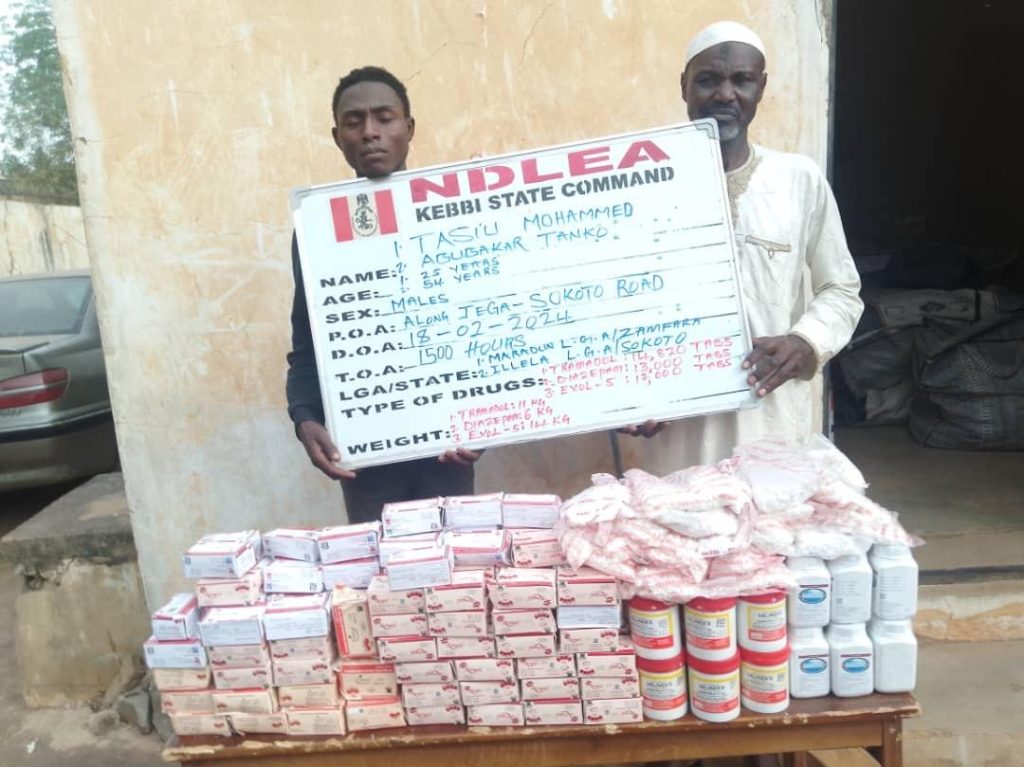
The agency also said another dock worker at the terminal, Mohammed Muktar Sule (alias organizer) who is equally linked to the syndicate is currently at large.
This was made known in a statement issued by Femi Babafemi, the NDLEA’s Director of Media and Advocacy, on Sunday.
Babafemi disclosed that the Agency had requested for a 100 percent joint examination of two containers marked MSCU 4581770 and TRHU 7968071 from South Africa based on credible intelligence.
He said the exercise was conducted with other stakeholders on January 18 and 19, 2024, during which 56.39kg cocaine and 795kg Colorado, a synthetic strong strain of cannabis, among other illegal items, were recovered from the containers.
Babafemi disclosed that the latest seizure brings the total recovered from the two containers to 56.39kg of cocaine and 987.9kg of Colorado, with a combined weight of 1,044.29kg.
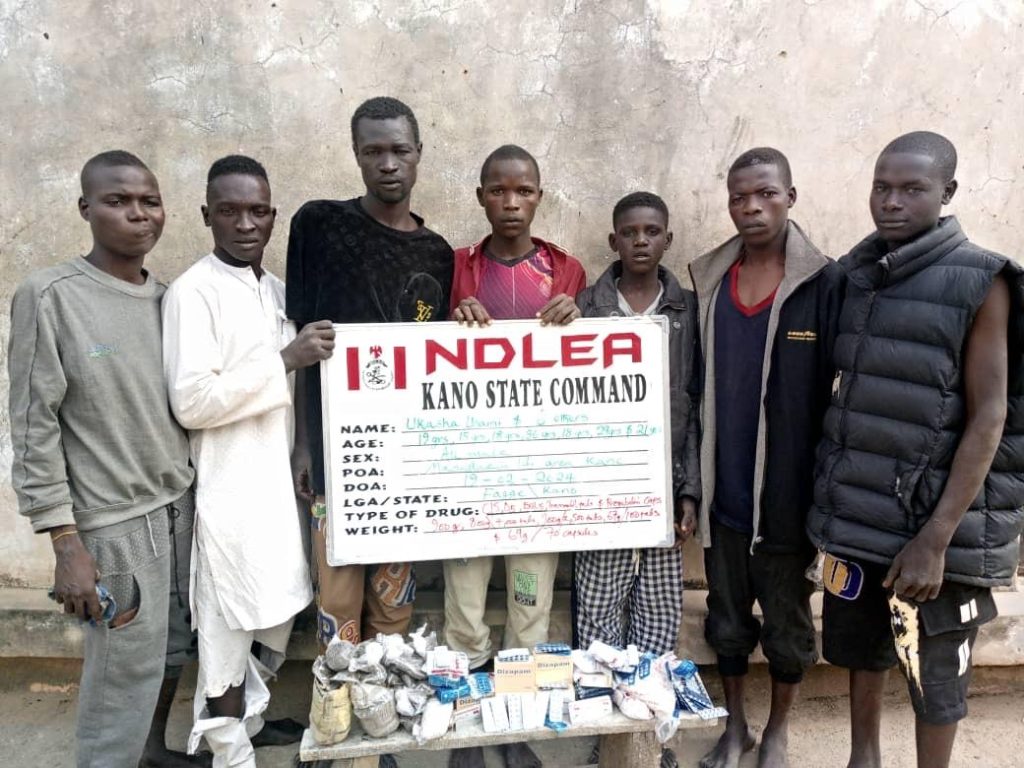
“Investigations have also revealed three kingpins believed to be based in South Africa and connected with the importation of the containers. They include: Odeyemi Taiwo Emmanuel; Akinyemi Olayinka and Adebayo Adewole Emmanuel, who are now on the Agency’s wanted list,” he added.
Similarly, NDLEA in Edo State on February 20 raided a drug joint under powerline off Etete Road, GRA Benin City, where they arrested a salesgirl, Jessica Destiny, 24, and recovered assorted illicit drugs.
The agency stated that a follow up operation the following day led to the arrest of the owner of the joint, 36-year-old Ibrahim Sani, who is the Commander, Arewa Association Vigilantes in the area.
It further disclosed that a consignment of 179kg cannabis was recovered by operatives at Badagry Waterside, Lagos on Wednesday, February 21. A 67-year-old grandpa, Rafiu Ogunro was nabbed on Thursday 22nd February, at Magbon, Ogun state with 57kg cannabis, 2,700 pills of tramadol, and 231 bottles of Codeine syrup, weighing 2.31 litres.
Announcing further interceptions and seizures made by the NDLEA, Babafemi said: “In Borno, a 25-year-old lady, Zara Mele was arrested with quantities of cocaine and heroin at Baga check point on Tuesday February 20, while Usman Shuaibu, 26, and Mohammed Lawan, 22, were also nabbed with quantities of the same class A drug at Meri and Babban Layi areas of Maiduguri the same day, respectively.
“No less than 44,820 pills of opioids being taken to Zamfara state by Tasiu Mohammed, 25, and Abubakar Tanko, 54, were intercepted along Jega-Sokoto road by NDLEA officers in Kebbi state, while a farmer Ali Abdulhamid, 35, was arrested in his farm where he grows tomatoes and some stems of cannabis sativa weighing 73 kilograms at Bakin Kasuwa village, Birnin Yero area of Igabi LGA, Kaduna state.
“Two suspects: Shuaibu Ahmed, 38, and Tanimu Abdullahi, 29, travelling in a commercial bus from Lagos to Kano with 99 blocks of cannabis weighing 37kg were intercepted by NDLEA officers along Kwali-Gwagwalada express road, Abuja on Monday, February 19, while one Michael Okefi was arrested at Upper Iweka area of Onitsha, Anambra state with 483 bottles of codeine-based cough syrup concealed in two 50-litre kegs. A follow up operation led to the arrest of the actual owner, Osinachi Jasper.
“At least 540 grams of cocaine concealed in canvas shoes heading to the UK were intercepted at a courier firm in Lagos on Friday, February 23, by NDLEA operatives of the Directorate of Operation and General Investigation, DOGI.
“Equally, a consignment of tramadol 225mg hidden in ladies headgear going to the UK was also seized the same day at the courier house, while another parcel containing ecstasy concealed in a body cream container meant for Cyprus was also intercepted.
“In Kano state, different quantities of opioids and other illicit drugs were recovered from at least 12 young men arrested in parts of Kano between Monday 19th and Friday 23rd February. Some of the suspects include: Yusuf Abdullahi,20; Usman Muh’d,18; Sadiq Jibrin, 20; Ibrahim Lawan, 25; Ukasha Usaini,19; Sahabi Lamini,15; Isiyaka Mohd, 28; Bashir Ayuba,36; Ahmad Idris,18; Abubakar Sani,29; Bashir Mohd, 21 and Udochukwu Ezekiel, 35”.
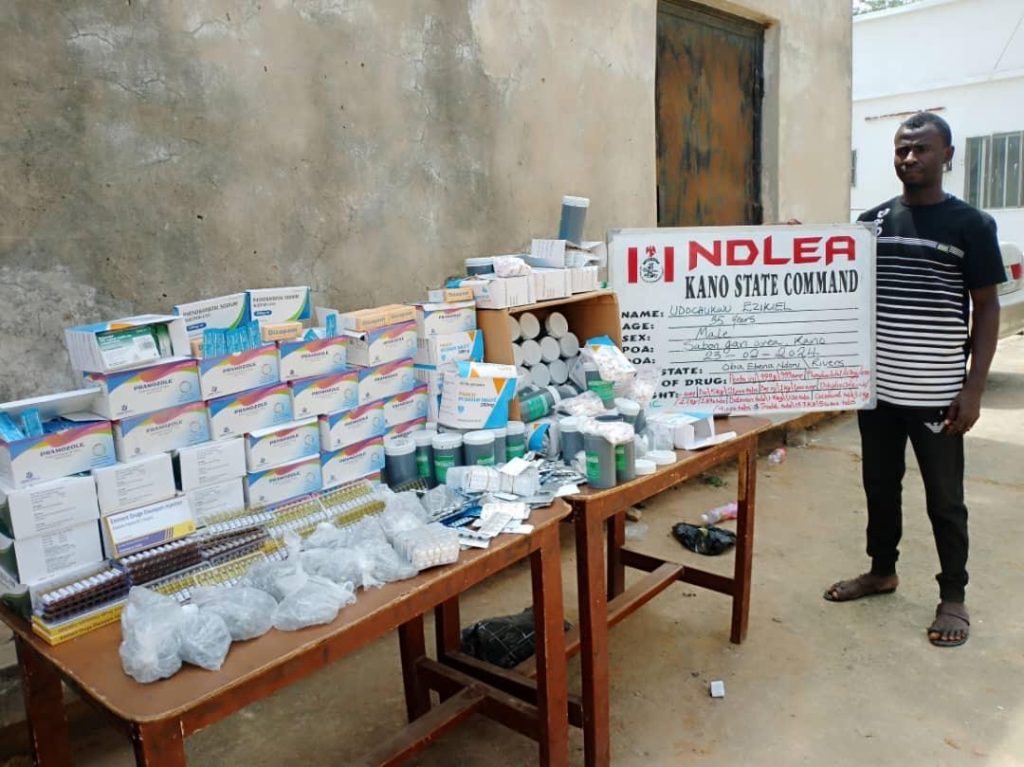
Reacting to the development, the Chairman/Chief Executive Officer of NDLEA, Brig. Gen. Mohamed Buba Marwa (Retd) commended the officers and men of the Tincan, Lagos, Edo, Ogun, Kaduna, Kano, Anambra, Kebbi, Borno, and FCT Commands of the Agency for their balanced efforts in the past week.
Marwa equally applauded their counterparts across the country for intensifying their WADA advocacy lectures thus creating parity between their drug supply reduction and drug demand reduction activities.
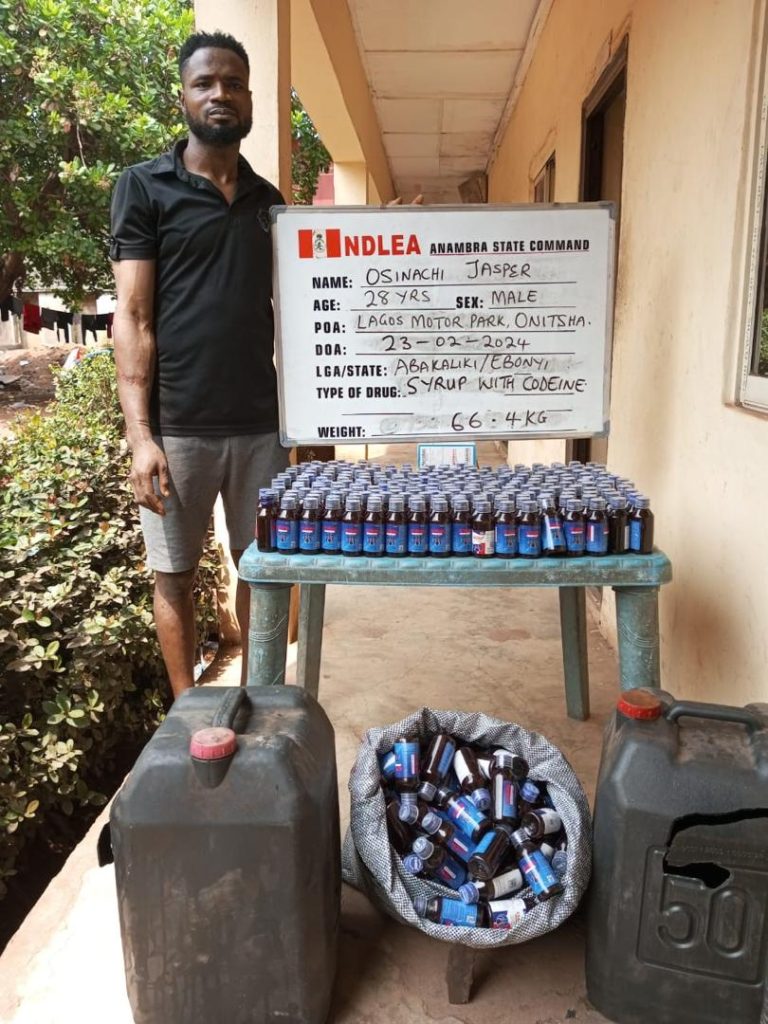
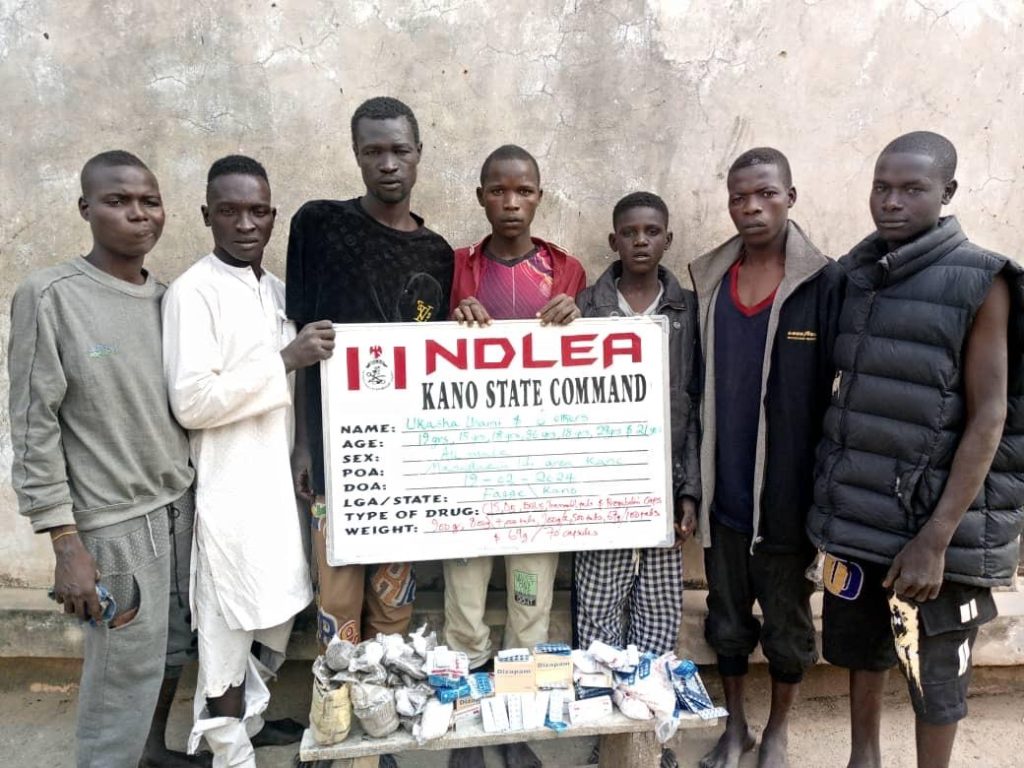
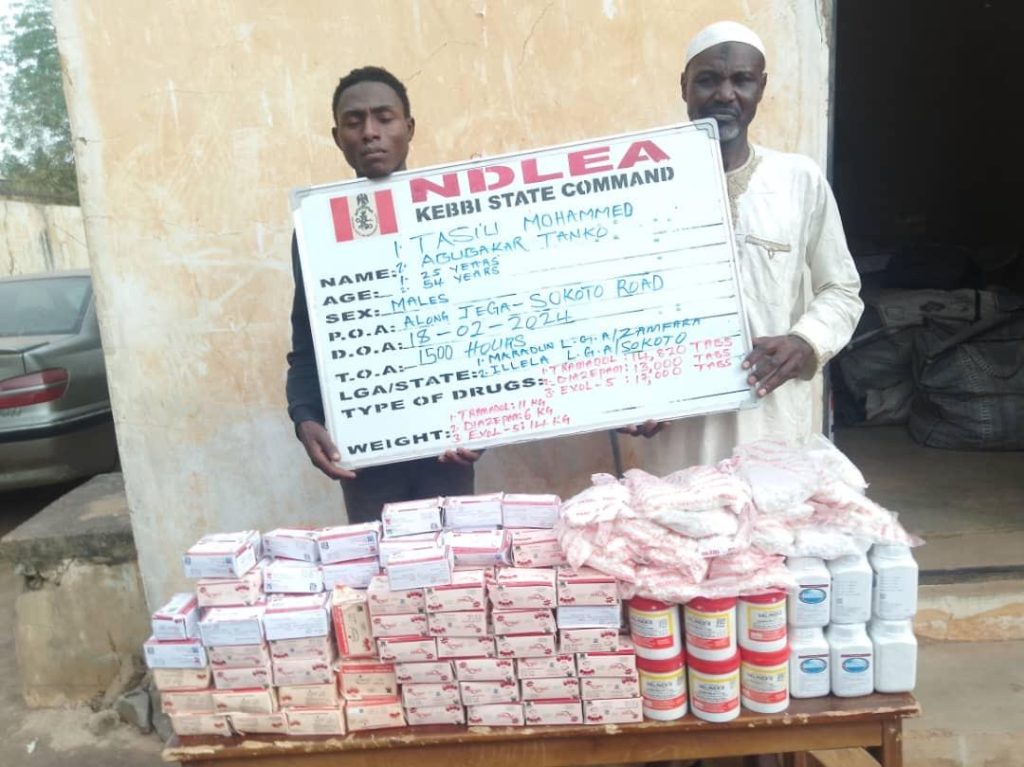
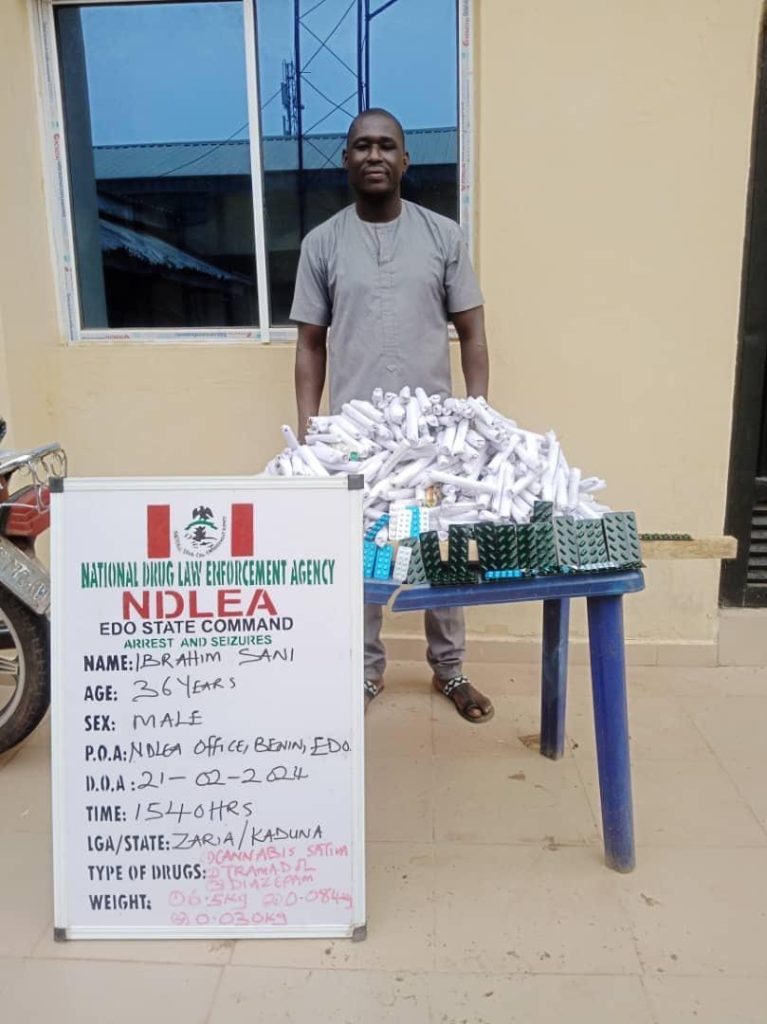
Hardship: APC mourns member and six others who died in stampede while buying rice at Customs office in Lagos
The All Progressives Congress has officially acknowledged the demise of one of its members, Comfort Adebanjo, and six others who sought to buy confiscated rice being sold by the Nigeria Customs Service as a measure to alleviate the economic challenges in the country.
The ruling party made the confirmation on Saturday in an obituary message released to mourn the late party member and the other Nigerians.
The PUNCH reports that customs says it has concluded plans to commence the direct distribution of seized food items to Nigerians due to the demonstration against the soaring cost of living in the country.
The National Public Relations Officer of the service, Abdullahi Maiwada disclosed this in a statement on Tuesday.
Maiwada said that the move was in response to the critical challenges of food security and the soaring cost of essential food items in the country.
He added that the items must be certified fit for consumption before they could be distributed to Nigerians.
However, there was a stampede on Friday, which led to the death of seven persons.
The Coordinator of FKL Ward E1, Lagos State of the APC, Oluwafemi Fadahunsi, and Secretary, Comrade Adebari Adewale, confirmed that Adebanjo was one of the seven persons who died during the stampede.
In the obituary released on Saturday, the party wrote, “It is with heavy hearts and regret we announce the painful death of one of our members in FKL WARD E1, Mrs Adebanjo Comfort Funmilayo of house number 104, Ibidun street by AKINHANMI street, Ojuelegba.
“She was among the 7 victims who died in the course of buying custom rice at Yaba.
“May God grant all the members of her family and all the residents of WARD E1 the fortitude to bear the irreplaceable loss.”
I Made N285m In One Day – Kizz Daniel Says
Oluwatobiloba Daniel Anidugbe, the Nigerian singer, who is populalry known as Kizz Daniel, has revealed that he made N285 million in a day.
The ‘Twe Twe’ crooner disclosed this during a ‘Truth or Dare’ session with fans on X on Saturday.
A fan asked, “How much did you make today? @KizzDaniel”
Kizz Daniel simply replied, “285m.”
However, the singer claimed that he doesn’t have a bank account.
Another fan asked, “How much dey your aza [bank account] like this?” to which Kizz Daniel replied, “I don’t have an account … Allah.”
He also revealed during the interactive session with fans that Mercedes is his favourite car brand.
Chizzy Alichi defeating Laide Bakare in celebrity boxing match (Watch)
Famous Nollywood actress, Chizzy Alichi breaks silence after knocking out and winning her colleague, Laide Bakare in a boxing match.
Recall that Alichi and Bakare decided to settle their differences through a celebrity boxing match held on Saturday, just as Portable and Charles Okocha did a few months back.
Videos captured the intense scuffle as the actresses engaged in combat.
Following the match, Alichi emerged as the winner after defeating Bakare.
Despite the physical altercation, Alichi took to her Instagram page to extend love to her rival, reminding Bakare of her promise to provide her with champagne.
Expressing joy over her victory, Alichi expressed gratitude to her colleagues and the event organizers for their efforts in putting together the remarkable event, which she described as fun.
She wrote:
“We WON !!!!
About last night, thank you guys for coming out, I appreciate my colleagues and to the organizers of the show, amazing work, Weldone???????? we had fun. My co winner @laidebakare love you and I’m still waiting for my champagne.”
View this post on Instagram

